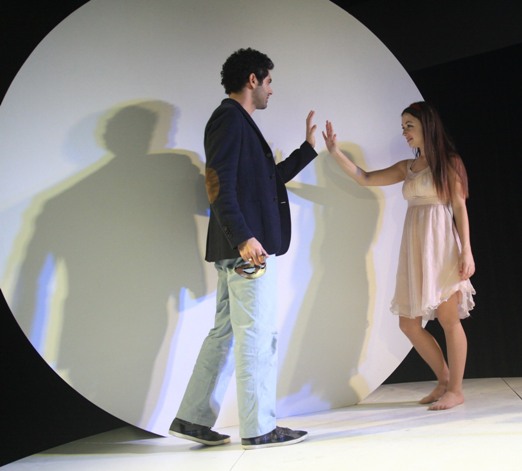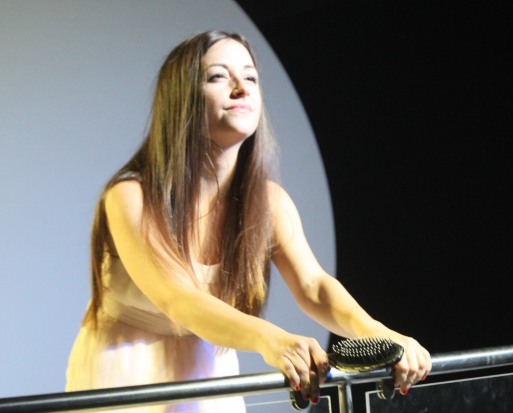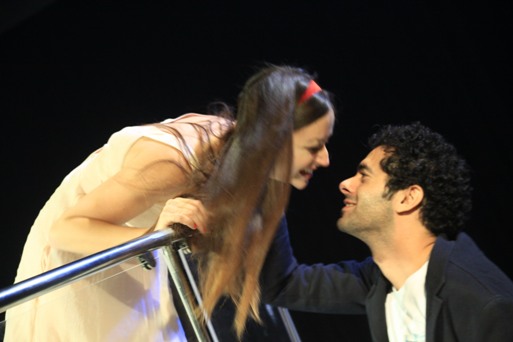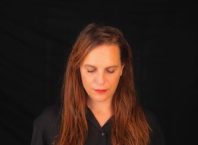The lights are pulsing red, violet, green with the beat of the music, masked figures undulate on the dance floor, while others congregate on the sidelines, watching, and the lines between gossip and conspiracy begin to blur. Amid the writhing bodies and whispered intrigue a girl sees a guy standing behind a pillar and her thoughts are as transparent as her chiffon dress: is he looking at me? Does he see me looking at him? If he walks over to talk to me, what will I say?

It’s Romeo and Juliet, the iconic love story everyone knows, and almost everyone from Prokofiev to Dire Straits has covered. Noam Shmuel’s Romeo and Juliet takes Shakespeare’s play off the pedestal and into the clubs and streets, with a distinctly Israeli feel.

In a press meeting that took place at the Cameri yesterday, January 2, 2010, Shmuel recalled his initial inspiration for the project, “About half a year ago I left my apartment and saw a Mercedes parked in the lot with a slaughtered chicken bleeding out on its hood. Then on the corner of Yehuda Maccabi and Namir Street a car carrying a reputed crime boss exploded. I told Omri – that’s Romeo and Juliet. You just need to glance at a newspaper to understand.” Shmuel’s Romeo and Juliet takes place in a contemporary urban reality; the government is fully aware of the mobster rivalry and violence that rules the streets, yet does not intervene. The first glimmers of love and the innocence of youth shine within this dark setting.
The Cameri Theatre production will premiere on January 4, 2011 in Cameri 3 – an ultra contemporary space that is designed for performances that are intimate and dynamic. The performance takes place in several different focal points in the room, while the audience on swiveling chairs, moves in the direction of the action. The rectangular room is divided into two sections of seats that face one another, separated by a wide passage that is also a performance space.

Romeo and Juliet makes use of this division to suit the plot: on entering, the audience will be divided into Capulets and Montagues and seated accordingly. Video and audio elements are key players in this production. Earphones supplied by WIPARTY will enable the audience to eavesdrop on whispered conversations, while LCD screens mounted on the wall will present their own parallel visual sequence.
Eli Bijaoui, who created a new translation of the play for this production, said that when he began the process he had “40% awe for Shakespeare’s original, 5% translation, and the rest was self-castration.” After agonizing over different versions and renditions he says he was finally able to let go and “attempt to release the William Shakespeare that was within me and devote myself to the play.” Ultimately, he based his translation on a reading of two sources: Shakespeare’s original, and a translation into French by François-Victor Hugo. Bijaoui chose “to adhere meticulously to the rhyme and meter” which “created a great sense of freedom to choose words that I might have had a hard time including otherwise.” Listening to the dialogue in Hebrew, one can immediately grasp Bijaoui’s meaning – the language is very free, with contemporary slang and references to Israeli culture.
Omri Nitzan, who directed Hamlet in this space, said of Cameri 3, “The space began as a parking lot and was slowly transformed into a small performance space – small in terms of its size but great in its ambition, creating a special closeness between the audience and actors. We are trying to conquer the 19th century syndrome of theatre where you see a small figure in the distance illuminated by stagelights. Here we feel the actor’s pulse, their breath, we see their eyes, and it brings us closer to the texts – Hamlet, now Romeo and Juliet, and there are other dreams…maybe we can create a Globe theatre in Tel Aviv.”

Romeo and Juliet by William Shakespeare, translated by Eli Bijaoui Director: Noam Shmuel Set design: Zeev Levi, Costumes: Avia Bash, Music: Eyal Weiss, Lighting: Keren Garnak, Video: Nimrod Zin Performers: Shay Egozi, Yoav Levi, Ziv Meir, Arieh Moskona, Ido Museri, Nir Manki, Nadav Nates, Hila Sorgin, Sara Von Schwartze, Yossi Kantz, Moran Kal, Rozina Cambos, Irad Rubinstein, Dan Shapira, Nelly Tagar.
Performances at The Cameri Theatre, 19 Shaul HaMelech Street, Tel Aviv, beginning January 4, 2011. Tickets and information: 03-6060960.
AYELET DEKEL








[…] – cast & all! The premiere of the Shakespeare play newly translated by Eli Bijaoui and directed by Noam Shmuel was postponed for 24 hours due to Shapira’s injury during rehearsals. Midnight East applauds […]
Comments are closed.